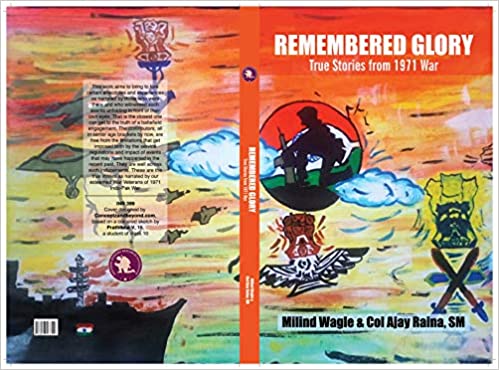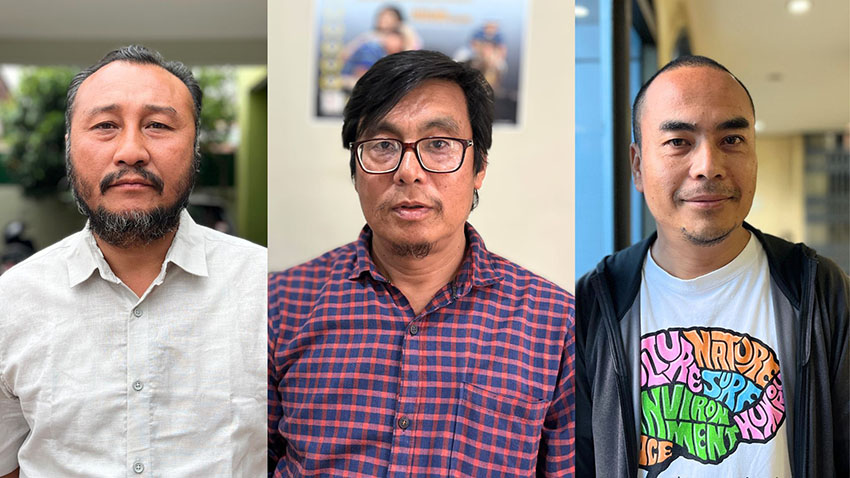Author: Milind Wagle & Col Ajay Raina, SM
Published by: Military History Research Foundation
Pages: 213 in paperback
Price: Rs. 399/-
MANY RARE INSPIRING STORIES OF 1971 INDO-PAK WAR
The 50th Anniversary of the1971 India-Pakistan War which culminated in liberation of Bangladesh, is getting marked by a number of books getting launched. In the lead is Remembered Glory, a welcome compendium of anecdotes/incidents/events straddling that war, many of which have been not much known but all of which are of critical actions as also informative and inspiring.
A serious drawback for India is that for over seventy years since its independence, its actual history has not been taught in schools. Much of that history, marked by many wars/conflicts has been supressed, or tampered, or twisted. In such circumstances, books, journals, films, theatre, and media covering wars and conflicts, play an important role of raising public consciousness about the nation’s history. It is important for a nation’s history to be taught, to be known, as it is a major factor in planning for the future and also in developing national pride.
The 1971 war stands out in some respects as an exception. It was a war well planned and conducted in almost a Kautilyan/Chanakyan mode under the rule of the same political party, but when it was headed by Mrs. Indira Gandhi. She and her predecessor, Mr. Lal Bahadur Shastri were two exceptional Congress leaders, who were assertive in dealing with Pakistan in 1971and 1965 respectively. Mrs. Gandhi had been assertive against the Chinese in 1967, when she approved use of artillery by Indian Army against the Chinese at Nathu La and Cho La, Sikkim. However, the assertiveness of both Mr. Shastri and Mrs. Gandhi against Pakistan lasted only till the 1965 and 1971 wars were fought. In the peace talks that followed both these wars, both leaders became soft. Mr. Shastri returned Zoji La and Mrs. Gandhi returned 93,000 Pakistani PsOW without extracting any concession from Pakistan in favour of India.
Except for these two Congress leaders, all the rest, before and after them, till 2014, were known for managing-or often mismanaging- India’s many post-Independence wars and conflicts by being utterly defensive
, always not wanting to “raise the level of conflict” and thereby, not appropriately utilising the capability of India’s armed forces for decisive results most importantly required to maintain its security and integrity.
Wars/conflicts for professional armed forces involve conferring gallantry awards but owing to the ‘fog of war’ and too much happening simultaneously, there are always many actions which do not get recorded or do not get sent to higher headquarters. Thereby, there always remain many unsung heroes.
The authors indeed deserve praise for their devoted, innovative and sustained effort to present eighty-two true stories of valour, over two volumes, of the 1971 India-Pakistan war lasting officially 13 days, in two theatres-Western and Eastern- and resulting in the liberation and birth of a new nation, Bangladesh. The struggle involving Bengali youth of erstwhile East Pakistan forming the Mukti Vahini (freedom force) began in March 1971, when ‘Bangabandhu’ Sheikh Mujibur Rehman won a massive electoral victory in March 1971, which Pak army -ruling Pakistan could simply not digest and it launched a massive pogrom which included killing millions of Bengali intellectuals and masses as well as raping millions (up to 4,00,000) of women and treating them as ‘war booty’.
It was very tense circumstances under which Tony Mascarenhas, a Pakistani journalist got his story of Pak army’s atrocities in East Pakistan published in the Sunday Times, a British paper, only after he was lucky enough to move with his family in a great hurry to UK, where he was speedily offered sanctuary/citizenship. The story broke and shocked the world but failed to move any nation, US, UK or any other, to take any action against Pakistan. US had already committed its 7th Fleet to enter Indian waters in support of Pakistan. Indian Navy Chief, Admiral S.M. (Charles) Nanda’s message to commanding officers of all Indian Naval ships were that if the Americans came too close, “call them aboard for a drink”.
On 16 December 1971, 93,000 Pakistani all ranks of mainly its army and some other services surrendered to Indian Army in the newly liberated Bangladesh. Taken as prisoners of war (Ps OW) by Indian Army, they were imprisoned comfortably and treated most humanely as promised by then Army Chief, Gen (later Field Marshal) SHFJ Manekshaw. Over a year later all 93,000 were repatriated in excellent health with a packet of sweets to each of them. In most harsh contrast, Pak army conducted the worst kind of torture by keeping at least 54 Indian Armed Forces personnel including many officers captured by them but not registered as PsOW. Every time there was a Red Cross arranged check, these hapless Indians were shifted from one jail to another, effectively hoodwinking officials and relatives who came to check out. Not being able to get these very unfortunate Indian personnel released from Pakistan is a major failure of the India. Those of them still alive are languishing in Pakistani jails till date. Their list is published in the first edition.
While both the editions of the book will be very engaging for a wide readership spanning sections and age-groups, for all those dealing with national security they are ‘must read’.
WordSword Features

The writer is editor WordSword Features. He is also a strategic analyst and former spokesperson, Defence Ministry and Indian Army, and can be contacted at wordsword02@gmail.











